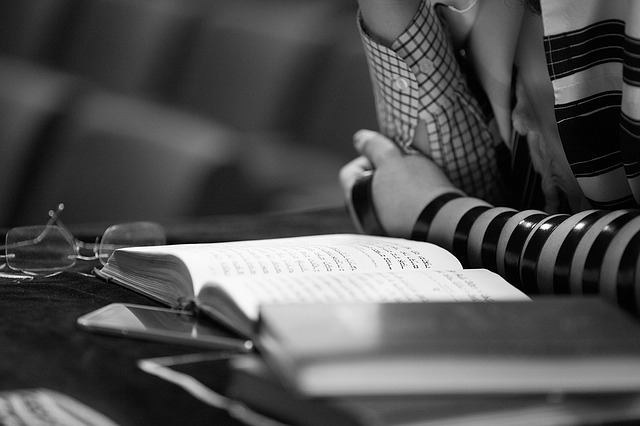
On Lag B’Omer, the last Wednesday of the semester, I snuck past a challah baking event to say goodbye to the Stony Brook University Chabad Rabbi, Adam Stein. Rabbi Adam and I danced with his children to the music from a livestream of Meron in his backyard. At a pause, I tapped my kippa and tzitzit and said, “I wanted to rub it in. You were wrong; I did stay religious these four years.”
Rabbi Adam responded with a chuckle, “You cheated. You went home every Shabbos.”
Since graduating, I’ve told this story to friends and rabbis with responses ranging from, “I agree: That’s cheating,” to “I never had any doubts you’d stay Orthodox” to “I thought I’d have to cut you out of my life after a year in secular college.”
As a Five Towns-grown, Modern Orthodox boy, the fear of assimilating, especially in secular college, has been seeded and cultivated within me from almost the beginning of my education. When I decided to attend Stony Brook University for undergrad, almost everyone (not my parents) freaked out.
One high school principal still reminds me that I was the first student from DRS, my yeshiva, to attend SBU for undergrad (I don’t think I was). My Rabbi expressed concern but left it at that. One friend tried to convince some other friends to agree not to give up on me even though I would attend a school with little Orthodox Jewish representation. Rabbi Adam told me it would be virtually impossible to maintain my religious observance.
For this reason, or because I’m all about preparation, I established a religious foundation for myself six months before attending Stony Brook. I emailed two JLIC rabbis. I learned with my rabbi in Israel while talking about challenges and solutions with others. By the time I started my freshman year, I had scheduled learning time with five rabbis in Israel, two friends, my Rabbi, and my dad each week. I made an effort to attend every Hillel and Chabad event on campus and immediately joined the Hillel student board. This, in addition to my own academic schedule.
The number I remember hearing regarding modern and centrist Orthodox Jews going off the derech secular college is one in four. I’m deeply confused about what that means. Is “off the derech” total denial of God? A shift to Conservative or Reform Judaism? Intermarriage? Does “secular college” include Yeshiva University or Touro College?
Based on what friends and rabbis taught, I expected to show up to an 8:00 a.m. college class that opened with a powerpoint entitled, “Philosophical reasons why Judaism is completely wrong and you should be a Marxist.” I expected to be invited to party after party while secular Jewish and non-Jewish classmates goaded me into drinking my weight in vodka and exploring sexuality towards orgiastic nirvana.
In real life, girls who had no problem divulging their sex lives took my being shomer negia (not touching those of the opposite sex) more seriously than I did. Students asked me about the thing on my head and the strings hanging out of my shirt. I had hours long conversation about feminism and Judaism, about circumcision and consent, about religious growth and challenges.
Of course there were difficulties, too. It’s easy to skip shacharit (morning services) when there is no minyan and you have 8:00 a.m. classes. I couldn’t keep up that freshman semester learning schedule and so had to cut it down. But small lapses in observance happen to us all no matter where we are in life. It’s up to us to work up and bounce back.
I think it’s a major misconception that people lose their religion when they get to college. In my experience, many of these people really lost their religion years prior. College is their first opportunity to explore alternative lifestyles without having their communities breathing down their necks. Someone with an unwavering dedication to Shabbat, for example, won’t cut corners once they’re in university. But someone who only kept Shabbat because their family and friends at home did probably won’t keep it through four years of college.
Reasons for leaving the fold of Orthodox Judaism can range from intellectual disagreements to the general trend towards secularization to not feeling comfortable within the system. To deride secular college is to lower the fever rather than heal the infection.
In college, I’ve found, people are generally accepting to those who can defend their practices. This is no reason to get complacent, but I feel no more obliged to fear collegiate pressure to give up my religious beliefs than the girl I meet at Starbucks who tells me she’s a practicing Wiccan. We’ve both clearly thought about and can defend our respective religious practices.
Throughout my four years, I was more likely to get, “Hey, I’m sorry to bother you—and please tell me if I’m being offensive—but what exactly are you celebrating this holiday?” than any philosophical attack.
To expect all young Orthodox Jews to only engage within Orthodox spaces is idealistic at best. Rather than express undue concern and try to pressure students to stay in Israel a second (or first) year or switch to a more “Orthodox-friendly” campus, rabbis, friends, and community leaders can offer support for young Jews’ journeys. I had enough chutzpah to bother people to learn with me but sometimes this seeming lack of support can dishearten young Jews further.
It would be better to instill a foundational understanding of our values and a support system for when we, inevitably, find ourselves somewhere Orthodoxy does not reign. For all the concerns about my leaving the “Orthodox bubble,” I’ve emerged with greater commitment than some who have remained within these four years. And I’ve been exposed to a wider and more nuanced world.
College is a time to explore and find yourself. We shouldn’t be told to erect walls and go four years without evolution of thought.
Educate young Jews to love and understand the foundations of Judaism, support them, and let them be.
Image via Pixabay









Olay Brezilya’da meydana geldi. Güvenlik kamerasına yansıyan görüntülerde bir çiftin tartıştığı görülüyor.
Kadın, erkek arkadaşından kaçmaya çalışsa da öfkeli
adam kadını bırakmıyor. Adamın.
De Doorgeef-CD-van-de-Week bevat muziek van Michael Gordon,
gespeeld door het Cello Octet Amsterdam. In de uitzending een prijsvraag waarmee je kans maakt op die CD ‘8’ met het gelijknamige
werk van Gordon door het Cello Octet. En meer werk van dezelfde
componist, naast ingetogen klanken van onder meer John Luther Adams.
Never move an excellent such as a income tax reimburse perfectly into a harmful point enjoy credit break-ins.
https://t.me/s/Escort_girls_in_Ashkelon
https://t.me/s/Escort_girls_in_Ashkelon